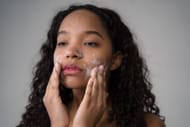'Do pimple patches work' - if this is your question, you have come to the right place. People suffering from acne can't get enough of this hot new product to treat acne: pimple patches. These tiny bandages can be stuck directly onto a zit to speed up the drying process.
Many of the patches are the size of small stickers and are made of a transparent material; others, though, are bright yellow stars or flower shapes covered in jewels. Their makers claim that they want to reduce the social stigma attached to acne by making their products more noticeable.
Having clear skin isn't the only benefit of treating acne. The humiliation of showing up to work with a too-big-to-ignore zit on your face can be lessened with the help of pimple patches, as their manufacturers claim. However, do pimple patches work?
Read on to find out about common types of acne and how do acne patches work.
How do pimple patches work?

Pimple patches are generally meant to treat surface-level, smaller zits. Despite their intended use for superficial, less severe forms of acne (also known as nodular or non-inflammatory acne), these products are often applied to more severe forms of acne (like cystic acne).
Blackheads, whiteheads and pus-filled bumps are examples of the mild, surface acne that these products are designed to address. It's unlikely that these patches can help cystic acne, as they don't penetrate deep enough.
Hydracolloid, the material used to make pimple patches, is also used to help treat chronic wounds by absorbing excess moisture. Pimple patches can be compared to tiny bandages for zits.
Acne can be dried up with the help of hydrocolloid dressings, which absorb moisture. The patches can speed up the healing process by absorbing the toxins trapped under the skin and shielding the zit from external bacteria, sunlight and face picking.

The stickers cover up the acne and stop you from picking at it, which is a double win. Scarring from picking can exacerbate the appearance of skin after the zit dries up.
Sun protection is helpful for healing acne, and pimple patches provide that. Non-medicated patches are patches that use hydrocolloid technology but no additional ingredients.
When it comes to healing more severe acne, other patches may boast additional microneedling prowess, but their microneedles simply don't go deep enough to heal these acnes.
Do pimple patches work: How to use pimple patches

Applying a pimple patch before bed is a good idea, as most of them need to be worn for a few hours for them to be effective. Moreover, there are models created to be barely noticeable when worn during the day.
Make sure your skin is completely dry before applying a pimple patch, as the patches will not adhere as well to damp skin. Make sure to clean the area first if your freshly extracted zit is oozing or bleeding.
After cleansing your face, place the pimple patch directly on the zit (they only treat active breakouts). Peeling it off can reduce the size and redness of pimples.
Do pimple patches work: Can they make acne worse?

The worst case scenario is that pimple patches won’t work or won't make your acne better. It's quite unheard of that they will make your acne worse. However, you should probably avoid using acne patches if your skin is sensitive.
To stay in place, pimple patches use adhesive, which can cause additional irritation to the area around the lesion if you have an allergy or sensitivity to it.
Do pimple patches work: Is there something they can't do?

There are significant limitations to using pimple patches, despite their potential efficacy in pre-existing lesions.
Closed lesions, deeper lesions and even blackheads and whiteheads, which are called comedones, do not respond to pimple patches. Acne cannot be prevented with them, and they cannot clear clogged pores or other precursors to acne outbreaks; they are only spot treatments for active bumps.
In other words, pimple patches won't help if you have cystic acne, severe breakouts or any other type of skin problem.
Do pimple patches work: Other treatments
Hopefully, you now know the answer to the question 'do pimple patches work'. Other treatments that work for pimples are mentioned below. You can also try these natural treatments for acne.
Salicylic Acid: You can find this beta hydroxy acid in acne treatments and cleansers, and it will help exfoliate the skin and remove dirt and oil.
Adapalene: Acne can be treated and prevented with the topical application of a vitamin A derivative, which reduces the stickiness of skin cells, reducing the likelihood that dead skin will accumulate in the pores.
Emergency Treatments: Quick-fix options, like cortisone and antibiotic injections, are available with dermatologists if you need to get rid of a large pimple in time for a key event.
